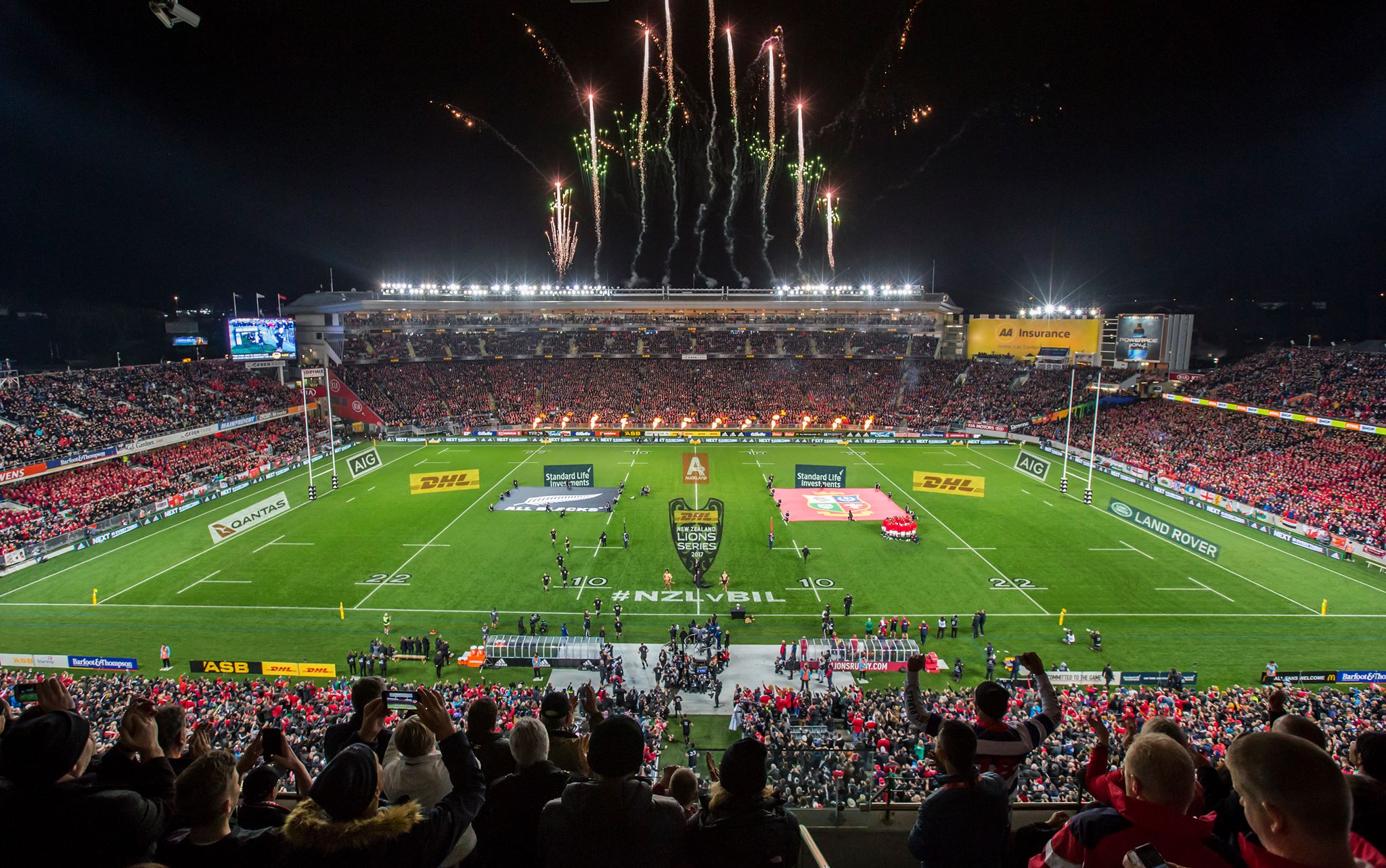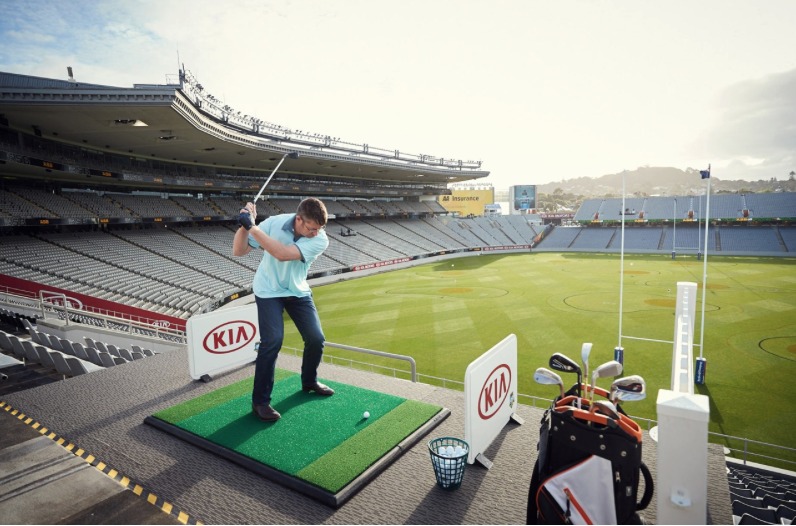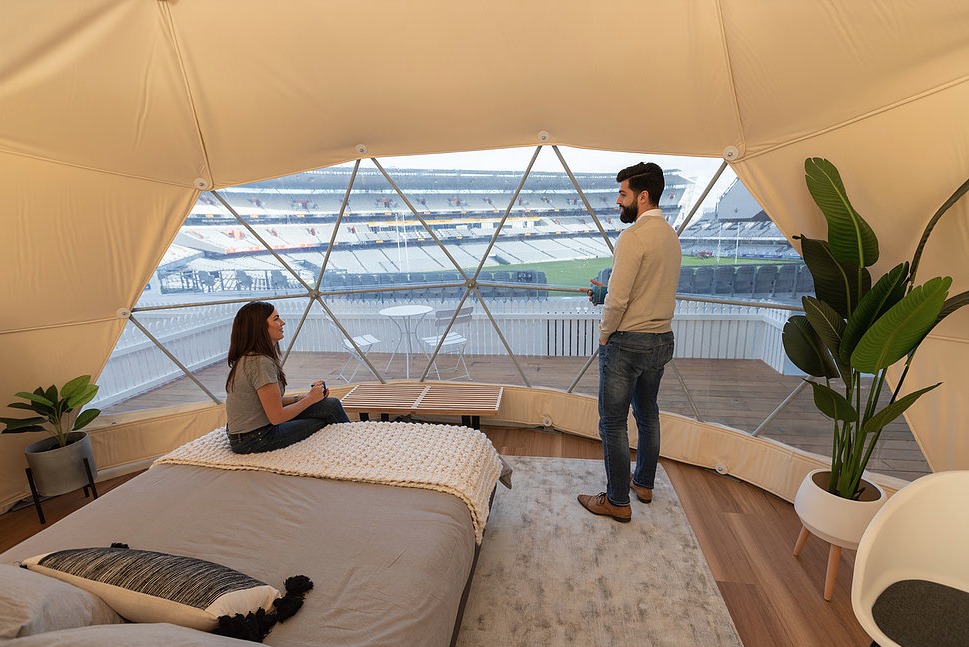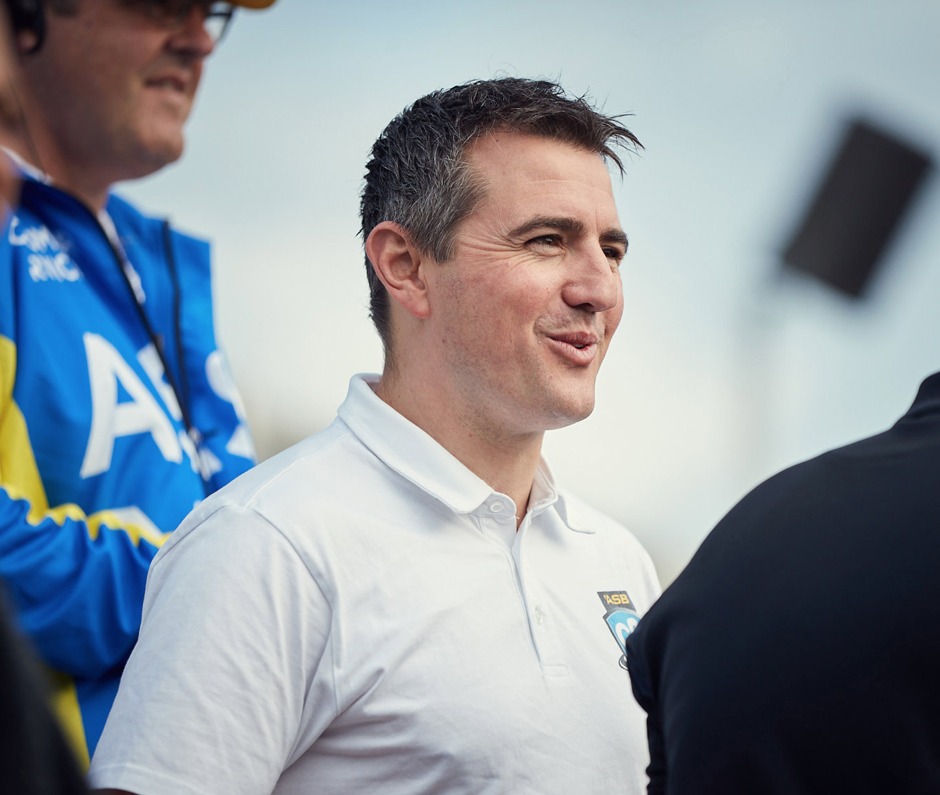- September 6, 2019
- Posted by: SportsV
- Categories: Featured Articles, Features, Home News, Industry News, Interviews, News, Press Releases

In this latest Q&A, we hear insights from Nick Sautner, Chief Executive Officer at Eden Park Stadium.
What does it mean to you as a multi-award-winning player of Aussie Rules football, sports fan and senior sports administrator to be responsible for the Eden Park Stadium and its future?
As an Australian who has worked in stadium and event management for almost 20 years, it’s an honour to be CEO of a stadium that has played host to some of the country’s most memorable sporting moments.
This year marks 25 years without a loss for the All Blacks at Eden Park. This phenomenal record is a tribute to how significant the ‘The Fortress’ is in the hearts and minds of many Aucklanders, New Zealanders, and sporting fans globally.
Having played AFL semi-professionally for around 15 years, I understand the sheer sacrifice and hard work that goes into becoming an elite sportsperson and achieving success. I am thrilled every time Eden Park hosts a sporting event because I recognise how profound this can be in the player’s life, for their whānau (extended family) and for the younger generation aspiring to achieve greatness on that same sporting field.
In future, I would love to see Eden Park support the arts community further, whether that be musicians in concert, visual artists hosting exhibitions or other celebrations of New Zealand’s impressive art and design industry.
Melbourne has the iconic MCG, London Wembley Stadium, why is it that Eden Park is considered such a sacred ground to New Zealanders?
Eden Park has such a rich history, global profile and is unquestionably New Zealand’s national stadium. Eden Park has a proven track record of delivering successful events since 1903, including the 1950 Empire Games, World Masters Games Opening Ceremony, 1981’s ‘Flour-bomb test’, 1987 and 2011 Rugby World Cup, 2015 Cricket World Cup and annual Bledisloe Cup matches.
In 2021, Eden Park is extremely proud to be hosting Te Matatini, which is a significant biannual kapa haka festival and the pinnacle event for Māori performing arts. 2021 will be a busy year for the stadium as we are also hosting fixtures for the Women’s Cricket World Cup and Women’s Rugby World Cup.
When patrons visit Eden Park, they scan their ticket and forget their mortgage – we provide escapism and lasting memories for friends and families from all walks of life.
What’s the most memorable event you’ve seen at Eden Park?
During my career I’ve been fortunate enough to experience a number of significant sporting musical and cultural events including The British Open, an FA Cup Final, the Super Bowl, The Last Night of The Proms and Trooping the Colour. However, in my humble opinion, there is no better experience than witnessing our bilingual national anthem and a haka at Eden Park (especially where 99% of the crowd are supporting the All Blacks)!
What are some of your biggest challenges at Eden Park, and how can you make sure it’s still a much-loved and financially successful venue into the future?
Eden Park remains an under-utilised public facility due in no small part to Auckland Council’s role as regulator (by way of setting consent conditions) and competitor (in the form of Regional Facilities Auckland who operate all other major outdoor stadiums in Auckland).
Auckland’s unprecedented growth in recent years demonstrates the city’s global appeal and diverse multicultural communities. Eden Park is for all of Auckland and New Zealand not solely for supporters of rugby and cricket. Auckland is the largest Polynesian city in the world and, along with its European, Asian and other diverse ethnic communities, there is now interest in all sporting codes, as well as recreational, musical, and cultural events.
There is considerable scope to increase the use of Eden Park and to diversify the range of activities and events that take place here. Our team is committed to working closely with the local community, Auckland Council, Government, all sporting codes and event promoters to make the most of the investment that has been made in this stadium and provide broad benefits to the people of the region. This includes working with the Council to ensure that the rules that apply to activities at Eden Park are fair, appropriate and support the range of activities for which the stadium was designed and enabled through parliamentary legislation.

What are some of the challenges you see all stadiums, when you look ahead? How can they keep the fans coming and loving the experience?
Stadiums should be considered a hub for the community — civic buildings that serve a function above and beyond the match day experience no different to a museum or library. They should be somewhere that local residents can use and engage with all year round, not huge spaces that are locked down after a match day.
People describe stadiums as cathedrals of the 21st century but I think of them more like town halls. We must also remember the Colosseum started construction in 70 AD within a residential area and was used for “gladiatorial contests and public spectacles such as mock sea battles, animal hunts, executions, re-enactments of famous battles, and dramas based on Classical mythology.
The building ceased to be used for entertainment in the early medieval era. It was later reused for such purposes as housing, workshops, quarters for a religious order, a fortress, a quarry, and a Christian shrine” – all according to Wikipedia!
The sports and entertainment landscape continues to evolve and stadia are challenged to combat consumption of sport through non-traditional channels. The need to encourage and engage patrons by creating compelling live experiences has never been more important.
As the leader at the coalface of our business, it’s vital to continually learn and engage with educational opportunities so that we can keep abreast of market trends, regulatory changes, stadia challenges and consider how these will potentially affect our operations.
Under my tenure, I have instigated a persistent focus on fostering innovation which has seen the procurement of numerous major sport, entertainment, religious and cultural events and initiatives from both sides of the Tasman.
Stadium’s fixed costs do not change irrespective of additional content therefore this business immediately contributes to profitability and indirectly enhances core revenues through economies of scale and promotional efficiencies. Through disrupting the traditional perception of stadium management, Eden Park is leading the industry globally by creating content to fill an often idle asset with event such as the G9 Stadium Golf, Staydium Glamping, zipline and rooftop tours, Pianos in the Park, street art installations, photography exhibitions, refugee gardens, our own Eden Park Honey, the cultural immersion of Haka on the Park and co-working spaces around the stadium.
You have been involved, directly or indirectly, with some of Australia’s newest sporting arenas, such as the one in the Docklands in Melbourne and the Perth Stadium, but you’ve also been a management consultant at the major Australian retailer Myer, for example, what tipped your career toward stadium management rather than your other options?
Stadiums are no different to airports, hotels, toll roads or shopping centres in that they are all required to operate in an agile nature subject to event demands. With significant upfront infrastructure costs and ongoing asset management obligations, operators are striving to increase utilisation to minimise idle capacity and maximise the revenue derived from the asset.
Approximately 20 years ago when I commenced in the industry, there was no such skillset as venue/stadium management. The industry still remains in an embryonic phase and the inclusion of more educated talent highlights that a genuine career path exists within the sector.
You had a very successful career in the Victorian Football League – a nine-time leading goal kicker, I think, and one of its most-decorated players ever. What did you learn on the sporting field that has helped your career and stuck with you through life?
There is no question that playing sport at an elite level helps to open doors in the business world.
On the playing field, the more times you lead to the right place by reading the play, the greater likelihood you would get the ball. This principle is no different in business – by approaching the right businesses that align with your culture, the greater likelihood you will be rewarded with a quality partner that shares your values.
In addition, the importance of understanding personalities and ensuring a team has a distribution of talents and skills. Nowadays, there is recognition of the importance of diversity. In my opinion diversity ought to be extended to include a range of personalities, talents and skills.
Were you ever tempted to play in the next level up, the Australian Football League? And how is your body holding up after all those years of high-level football.
I always aspired to play at the highest level for the longest period while balancing study and work commitments. I would have loved to be listed by an AFL club but the opportunity didn’t eventuate. On reflection, I maintain that the decision to pursue my professional career, off the field, was the right one.
I remember during a module, I invited the team to Telstra Dome to get away from the Carlton campus and complete an assignment. It was to their great surprise that I was in fact playing in the EJ Whitten Legend Game!
I still believe the VFL is the premier state league competition in Australia and the introduction of rookie lists and the mid-season draft will provide greater pressure for AFL recruiting officers to consider 21 and 22 year-olds.

As someone who has managed to forge a successful career since leaving the sporting field, what advice would you give professional sports players to set themselves up for a sustainable future once they leave the field?
When discussing future employment opportunities with athletes during their professional careers, I often say, sport will be two maybe three chapters in your book of life – now is the time to start planning for the writing of the remaining 25 chapters.
As athletes, we are trained to push our bodies and strive for success. These sorts of challenges are mental as much as physical and leave you feeling a renewed sense of self-belief, self-worth and motivation when success, however defined, is achieved. I often wonder whether retired professional athletes struggle from missing that goal setting and goal achieving rhythm in their lives.
On the field success is no different to boardroom success: performance can be optimised through building relationships formed on trust, values and collaboration. The results will come but often it takes a strong person not to conform and who is willing to challenge the norm.
Since leaving the sporting world, I have visited Africa on two occasions for very different purposes. In 2014 I volunteered as an English teacher in Zanzibar, Tanzania. This experience, whilst not physically taxing, was spiritually quite profound as it provided a renewed sense of gratitude for my circumstances and a reminder that my actions can positively impact the lives of others. On the other occasion, in 2016, I hiked Mount Kilimanjaro, also in Tanzania, to fundraise for the Prostate Cancer Foundation of Australia. Collectively, we raised over $60,000 for this important cause however the challenge in raising such a sum could not be outdone by the physical challenge of summiting Africa’s highest mountain. Climbing to approximately 19,340 feet above sea level and crossing five ecological zones was tough but achieving this goal was extremely fulfilling and motivating.
As I used to say on the footy field, ‘if you believe, you will achieve’!

Huge thanks to Nick for taking the time to do this Q&A with us.
Images, courtesy: Eden Park Stadium
About Eden Park
Eden Park is New Zealand’s national stadium and a globally-iconic arena, located in central Auckland.
Eden Park Trust operates as a statutory not-for-profit body corporate, registered as a charitable trust with the Charities Commission. Its objectives are to promote, operate and develop Eden Park as a high quality multi-purpose stadium for the use and benefit of rugby and cricket as well as other sporting codes and other recreational, musical, and cultural events for the benefit of the public of the Auckland region.
Its rich history and profile is unmatched by any other stadium in the country. From its beginnings as a cricket ground in 1903, Eden Park became the primary venue for major summer and winter sport in Auckland when in 1913, the owner, Auckland Cricket, leased winter use of the ground to Auckland Rugby.
A Deed of Trust establishing Auckland Cricket and Auckland Rugby as the beneficial owners of Eden Park was signed in 1926 and has since been enshrined in legislation. Most notably remembered for hosting the 1987 and 2011 Rugby World Cup Finals, Eden Park remains the home of both Auckland Cricket and Auckland Rugby as it has been for more than a century.
Each year, more than half a million sports and entertainment fans from around the world visit Eden Park. The stadium successfully hosts sell-out crowds of up to 50,000 on match days and hosts more than 1,000 non-match day functions per year.
ALSD International – Europe’s one and only event dedicated to the Premium Seat & Hospitality sector – is coming to Croke Park Stadium this October, where some 50+ high-calibre experts from across Europe and North America will be providing insights on how to increase revenues through new builds, renovations and service expansions, as well as via the latest F&B and technology offerings.
#ALSDInternational – Europe’s leading event dedicated to the Premium Seat & Hospitality sector
#sportsvenuebiz


